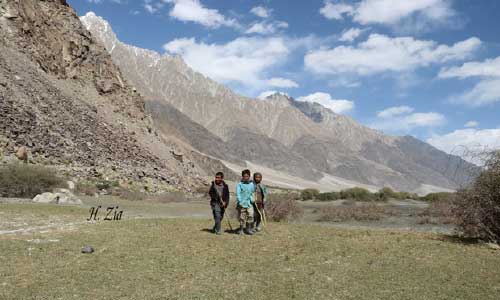Wakhan Corridor, in the Afghan province of Badakhshan, has been the homeland of Wakhi people for more than 2500 years, There live more than 18,000 Wakhi and Kyrgyz people in Wakhan and Pamirs (little and big Pamirs). There is no footprint of war or violence in Wakhan corridor since no militant group, not even the Taliban, entered the corridor.
Few days back, I journeyed the corridor without concern about security issues. I felt the warm hospitality of local people, who served me local products such as milk, yoghurt, chicken, etc. Agriculture and livestock are the only source of income in Wakhan corridor as both men and women work shoulder-to-shoulder on their land. People speak Wakhi Language, but many of them, mainly the children who go to school, speak Persian/Dari fluently.
If you travel along the Wakhan Corridor, local people will give you a welcoming smile and host you with open arms. They are highly hospitable and well-behaved. Despite cold weather and hard life in the corridor, the local people enjoy peaceful and simple life there. A number of old men and women have lived their entire life there without traveling even to the capital city of Kabul. People showed their hatred to war and violence and hoped for peace and stability around the country.
I traveled from Ishkashim district, bordering Tajikistan, to Sarhad-e-Broghil (210km) with the help of Yar Mohammad Atahi, who guided me in the tour. Atahi was highly supportive and sociable. Living in Ishkashim district, Atahi knew each corner of the corridor. In my three-day trip in Ishkashim, I stayed two days in his home, who served me very delicious food with great hospitality.
Wakhan Corridor has great tourist attractions. “Wakhan is the second National Park of Afghanistan with more than 1000 tourists annually and people are honorable and hundred percent obedient to law here,” said Nusratullah Naeil, district governor of Wakhan. He added that the “rare culture of Wakhi and Kyrgyz, nice natural landscape, and the existence of wildlife” were the tourist attractions. He maintained that the district was totally secure.
It was an amazing journey in the corridor, in which Amu River travels in the heart of it dividing Tajikistan and Afghanistan.
However, there are some challenges in the corridor. The weather is really cold and people live a hard life. Meanwhile, the bulk of Wakhan residents live under poverty line despite the fact that both men and women work from dawn to dusk. They hardly make the ends meet. As I spoke to the local people, they complained about poverty as well as lack of attention from the government side.
I was caught by surprise to see an old widow live, along with her children, in a single village. She brought up her children alone as her husband left them behind. She worked on land, feed her children, and sent them to a remote school. I talked to her how she could deal with a hard life and lived alone in a village without any neighbors in the surroundings. She said that she had nowhere to go. Surprisingly, two of her children were graduated from Teacher Training Center and could speak English. In a remote village without having television, I thought that she even would not know the name of Afghanistan’s president. As I asked this question, she laughed and said that “Ashraf Ghani” was the president. As I asked about her demands from the government, she complained about poverty and expected financial support. I personally believe that she was a real heroine as she brought up her children alone in a village without anyone living near her.
I also felt that the folklore and tradition of Wakhan Corridor was at stake. Old women wear traditional dresses and hat under their veil, which is no more practiced by girls or some young women. The government is unlikely to adopt a strategy to preserve the traditional culture or prevent its erosion, which is really a great pity. I remember when I was in China, the Chinese government facilitated ethnic minorities to display their culture to tourists through wearing traditional dresses, which attracted tourists and preserved cultural tradition.
Overall, Wakhan Corridor is an amazing and secure place and a tourist attraction destination with hospitable people. The government has to work further for the attraction of tourists and improvement of people’s life standard. It has to create jobs, asphalt the roads and create more facilities for tourists. Linking and connectivity is highly important for tourist attractions and promoting local’s life standard that the government should work for.
Home » Opinion » Wakhan Corridor – An Amazing Land
Wakhan Corridor – An Amazing Land
| Hujjatullah Zia

